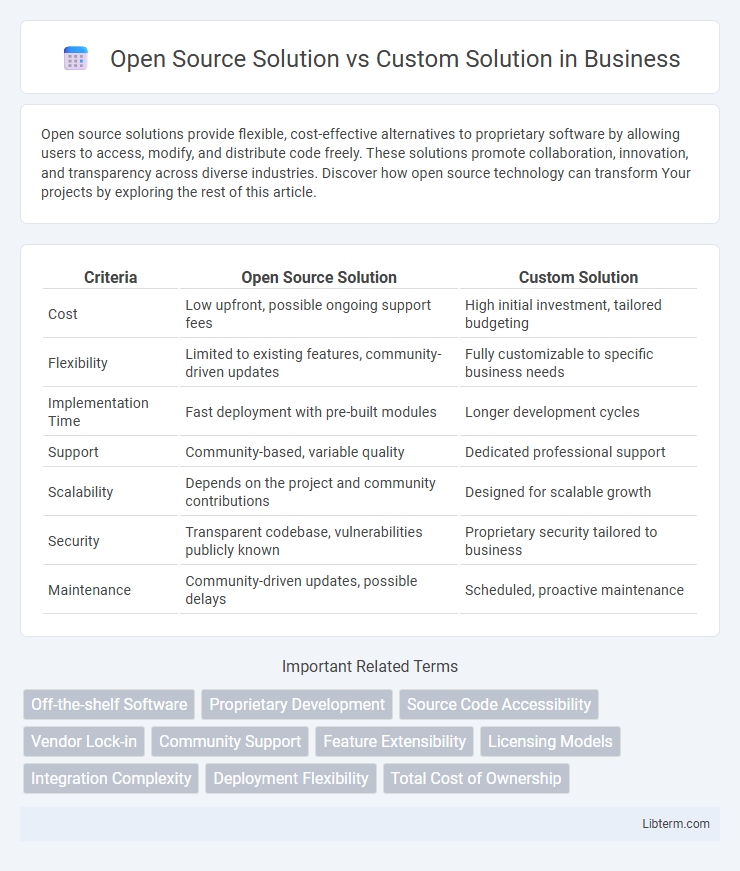Open source solutions provide flexible, cost-effective alternatives to proprietary software by allowing users to access, modify, and distribute code freely. These solutions promote collaboration, innovation, and transparency across diverse industries. Discover how open source technology can transform Your projects by exploring the rest of this article.
Table of Comparison
| Criteria | Open Source Solution | Custom Solution |
|---|---|---|
| Cost | Low upfront, possible ongoing support fees | High initial investment, tailored budgeting |
| Flexibility | Limited to existing features, community-driven updates | Fully customizable to specific business needs |
| Implementation Time | Fast deployment with pre-built modules | Longer development cycles |
| Support | Community-based, variable quality | Dedicated professional support |
| Scalability | Depends on the project and community contributions | Designed for scalable growth |
| Security | Transparent codebase, vulnerabilities publicly known | Proprietary security tailored to business |
| Maintenance | Community-driven updates, possible delays | Scheduled, proactive maintenance |
Understanding Open Source Solutions
Open source solutions provide access to publicly available source code, allowing organizations to modify and customize software without licensing fees. These solutions often benefit from active communities that contribute to rapid updates, security patches, and feature enhancements, ensuring continuous improvement. Understanding the flexibility, cost-effectiveness, and community support of open source software is crucial for businesses evaluating scalable technology implementations.
Defining Custom Solutions
Custom solutions are tailored software applications designed specifically to meet unique business requirements, offering precise functionality that off-the-shelf products cannot provide. These solutions enable full control over features, scalability, and integration, ensuring alignment with long-term organizational goals. Investing in custom development enhances flexibility and competitive advantage by addressing individual workflows and challenges.
Cost Comparison: Open Source vs Custom
Open source solutions typically offer lower initial costs due to free licensing and community-driven support, making them ideal for budget-conscious projects. Custom solutions often require higher upfront investment for development, but provide tailored functionality and scalability that can reduce long-term costs associated with inefficiencies or limited features. Organizations must weigh the trade-offs between lower immediate expenses and the potential for optimized performance and maintenance savings over time.
Flexibility and Scalability
Open source solutions offer high flexibility through customizable codebases and active community support, enabling rapid adaptation to changing business needs. Custom solutions provide tailored scalability, designed specifically to handle unique workloads and growth patterns without unnecessary features. Both approaches require careful evaluation of long-term maintenance and integration capabilities to ensure sustainable expansion.
Security and Compliance Considerations
Open source solutions offer transparency and community-vetted security, enabling faster identification of vulnerabilities and compliance with open standards such as GDPR and HIPAA. Custom solutions provide tailored security controls and compliance features designed specifically to meet unique organizational policies and regulatory requirements. Evaluating risk exposure, patch management capabilities, and audit trail integration is crucial when choosing between open source and custom-built security architectures.
Development Speed and Time to Market
Open source solutions accelerate development speed by providing pre-built, tested components that reduce coding time, enabling faster prototyping. Custom solutions require extensive development from scratch, resulting in longer time to market but offer tailored features that precisely meet business needs. Rapid deployment of open source tools often shortens project timelines, whereas custom builds demand thorough design and testing phases that can delay launch.
Support and Community Resources
Open source solutions benefit from extensive community support, offering access to forums, documentation, and frequent updates contributed by a diverse developer base. Custom solutions provide dedicated, often personalized support tailored to specific business needs, ensuring faster issue resolution and alignment with unique workflows. Reliance on open source communities can introduce variability in response times, whereas custom support guarantees consistent, expert assistance.
Integration Capabilities
Open source solutions offer extensive integration capabilities through pre-built APIs and community-supported plugins, enabling seamless connectivity with a wide range of third-party systems. Custom solutions provide tailored integration frameworks designed specifically for unique business workflows and legacy systems, ensuring optimal performance and compatibility. Both approaches require thorough evaluation of compatibility standards, scalability potential, and future maintainability to maximize integration success.
Long-Term Maintenance and Upgrades
Open source solutions offer continuous improvements and community-driven updates, reducing long-term maintenance costs and expediting upgrades through shared resources. Custom solutions require dedicated internal teams for maintenance, offering tailored upgrades but potentially increasing expenses and complexity over time. Evaluating the scalability and support framework is crucial for sustaining system performance and minimizing downtime during future upgrades.
Choosing the Right Solution for Your Business
Selecting the right solution for your business requires evaluating the cost-effectiveness, flexibility, and scalability of Open Source Solutions versus Custom Solutions. Open Source Solutions offer faster deployment and community-driven innovation, while Custom Solutions provide tailored features aligned with specific business processes and competitive advantages. Assessing your organization's technical expertise, budget constraints, and growth plans ensures a strategic decision that maximizes long-term ROI and operational efficiency.
Open Source Solution Infographic

 libterm.com
libterm.com